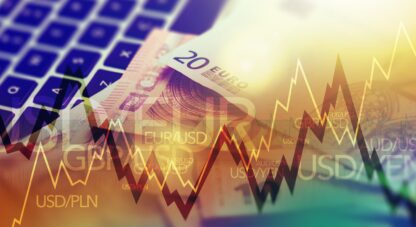Podcast: Play in new window
- If The Stock Market Were A Rorschach Test, Would You See The Top?
- Preview Of A Must Read “The Price Of Time”
- Bezos Is Unloading Amazon Stock
“This is a very data-heavy week, and that one number, the PCE, is the big dog. It’s the one that people will be looking at because it’s going to drive the conversation around interest rates moving higher or lower. Markets, you recall the insane view that we were going to have somewhere between five to seven rate cuts this year. That’s what the bond market was pricing in. Markets have moderated from five, and now they’re expecting about three. Equities, gosh, they’re another story altogether. Tech in particular, we see huge vulnerability if there’s disappointments to the expectations within not only the tech sub-sector within the stock market, but equities in particular. If rates are not going lower, the top in equities is being put in as we speak.” —David McAlvany
Kevin: Welcome to The McAlvany Weekly Commentary. I’m Kevin Orrick, along with David McAlvany.
Well, David, the miracle of technology makes me feel like you’re right next door, but actually, I think you’re standing right now out on a PGA professional golf course. I think I hear the sprinklers in the background.
David: That’s right. Ponte Vedra Beach, 110 Championship Way. The TPC Sawgrass golf course. It’s beautiful. They’re getting set up for a big event, so you might hear a little background noise, but it sure beats the background music if I was inside. So, nothing like elevator music to kill a mood.
Kevin: I know where you went with your son, and I’m so jealous, Dave. I remember when you sent me a picture from Jekyll Island. Obviously, being in the financial business, Jekyll Island was the turning point. I was thinking about it when you took your 16-year-old son there a couple of days ago. I was thinking that often the thing that we should fear the most, we cry out for as a solution to a pressing problem that’s urgent. And I think about the Federal Reserve and what occurred at Jekyll Island. But it didn’t just happen in a vacuum, did it?
David: No. And I just have to correct you. If he were 16, I’d be 48 instead of 49, turning 50. This is a big year for both of us because he turns 18 from 17 and I turn 50. So, this is the reality. Time marches on.
Kevin: Where does time go? Yeah.
David: Yeah. Sunday brunch was at the Jekyll Island Club, and of course, it was proceeded by a brief history of the crisis and collusion and conspiracy, and the launch of our third central bank. It began with a fire in San Francisco and the draining of bank liquidity from New York City. And this, of course, was the period of time where you had a finite resource. When you’re talking about the money supply, it was gold. As finite resources shifted away from the East Coast, leaving the banking elite vulnerable to another financial panic, here you had the birth of a new solution.
Kevin: Yeah, it’s a solution at least for the time, but unfortunately, talk about it creating a wealth gap. We’ll talk about that a little bit later, but this massive credit that’s been expanded through the Federal Reserve has created probably the greatest wealth gap in world history.
David: The idea was incubated in secrecy on Jekyll Island. The Federal Reserve was to change our system of money and credit so that in an emergency there would be ample liquidity to keep commercial banks from being on the brink, and promote business as usual in case of duress within the economy. So, what was born, what many think of as the creature of Jekyll Island, would not only provide liquidity in periods of acute stress, but over time, and as we’ve seen, money and credit would expand without limit. 34 trillion in debt is starting to get people’s attention. I think that’s one of the notable things, Kevin, as we see in the news more and more, hedge fund and very significant Wall Street players seeing our fiscal crisis, it’s here. And while we face it, there is an old cause. The foundation was laid with a system of unsound money and credit back in 1913. I’ve never traveled to the club with my oldest son, but we got a chance to this weekend.
Kevin: I can’t help but thinking of John Law a few hundred years ago, you were talking about the system being laid in 1913, but actually, this creation of unlimited amount of currency was tested in France back in the 1700s, and it became a total failure. It was an amazing success for a short period of time. But you and I are both reading Edward Chancellor’s book right now, and he goes into detail as to why that cannot sustain itself. When I see the Federal Reserve, I see the ghost of John Law trying the same trick again.
David: And context is really key. If we’re there on Jekyll Island, visiting with the ghost of the Federal Reserve, that’s one thing. Seeing where something comes from, understanding how something was created helps to set the context for money and credit in the modern era. And the reality is very few central bankers today take responsibility for, or even connect the dots between, financial market fragility and the actions that they take. They would see no connection. And this is a problem because they are often blindsided. I think it’s easier to be blindsided when you’re steering a money system with your eyes closed, and I think that kind of a blindside is about to happen again.
Kevin: One of the things, Dave, I love about this program, and it takes a lot of time, but oftentimes, you’ll hand me a book and you’ll say, “Hey, we’re interviewing this guy in the next six weeks. Read the book.” And we do this over and over and over. But really, wisdom comes from reflecting on not only what is, but what was. That can help you look forward as to what may happen in the future.
David: Well, that’s right. The future is speculative. We don’t know exactly how things unfold, but to the degree that we understand the past and the present, we bring some clarity as to what probabilities may be. So, in the past 20 years, a lot of reading on the subject of interest rates has occurred. I’ve invested a lot of time in something that for most people would be fairly boring. I’ve argued elsewhere that it takes some grit to get through something as dry as a tome on interest rates. But actually, the closer you get to them, the more you find these fascinating vignettes of not only intellectual trial and error, but boundary-pushing in terms of what money is and what it can be used for. And so many of those issues where trial and error is in play, they can bring you to the brink, they can bring you into something that’s very high drama.
Kevin: And you’ve really taught me that, Dave. I’ve got to admit, you read a lot more on interest rates than I do, but this book by Edward Chancellor is just absolutely compelling. I’m jealous because while I’m here, I’m going to complain a little bit, but while I’m here in Durango working, you’re flying all over the world. You get a lot of your reading done on the plane.
David: It’s one of my favorite places to read. It’s one of those places where I can completely focus, and everything else gets pushed out. I get the same sense when I’m reading on a plane as I do when I’m skiing very quickly down a hillside. It’s where everything else fades away. And so, yeah, whenever I’m on a plane, I read, not in a social way. I mean I love conversation and occasionally I’m floored by a conversation with a stranger. The world is full of interesting people, enough of them anyways. So, I am always hoping that saying hello is going to be meaningful in some way. So, I’m headed to a conference with other CEOs and business owners, and I’m reading Edward Chancellor’s The Price of Time. He agreed to be on the podcast to discuss the book, in large part because of his respect for Andrew Smithers, a previous guest on the podcast.
Kevin: Yeah. Isn’t it interesting as we read through this book, it’s like, wow, there’s a lot of different guests on here? But Andrew Smithers, for the person who’s listened to this commentary for a while, if you’re hearing Dave with a background noise, when you interviewed Andrew Smithers, Dave, you were in Scotland. And the background noise was this beautiful harpist in the back room. We’ve got a PGA golf course in the background now for you, but you remember that?
David: Oh, it would be worth going back to the archives and listening to it, but the opportunity was Russell Napier put on a course on the financial market history or the history of the financial markets, and he had some fascinating professors come in to teach. One of them was Smithers. And I had read Smithers’ book on Tobin’s Q, so it was very interesting. That was a pull for me to be there. So, yeah, as I go through the bibliography, Smithers is there. And in this book by Chancellor, The Price of Time, I come across 13 other commentary guests, and I just think to myself, “We’re going to get along. We are going to get along.”
Kevin: Yeah, whenever you read a book, Dave, if you really like the book, you order a stack of another eight to 12 books. I don’t know how you keep up, but you go through the bibliography. That’s how you’ve built your reading list through the years. And obviously, that’s how you’ve built your library through the years.
David: Of course, the way I read a bibliography, it’s like kid walking into a candy store. And there’s 27 people that are in the back leaf of this particular book that I’d love to have on the program, that I’d love to have a conversation with. Unfortunately, some of them are dead. But there are 16 books that I’ll be ordering and studying. Bibliography to me is like a treasure map.
Kevin: Yeah. Well, you know what was cool, too, in the Chancellor book, Doug Noland is mentioned. We followed the work of Doug Noland for many years before you brought him on staff.
David: Sure. Then, in the acknowledgements, a section on Doug and the remarkable work that he’s done in the Credit Bubble Bulletin. And as it turns out, Doug and Edward have had many conversations in the past. Doug is part of our wealth management team, runs our Tactical Short program, and is a part of our risk management strategy for all the things that we do. Yes, he’s a talent, but I would say few are his equal in understanding the nature of the credit system that we have and its impact on the unfolding bubble dynamics we have today. I know he’s talented. It’s heartening to me. I’m glad to know that his talent is recognized around the globe.
Kevin: And you brought up before that when you’re reading— You love to talk on the plane too. Oftentimes, you’ll come back and you’ll say, “I chatted with this person and I got this book read.” So, I can see maybe what you need to do, Dave, and I remember there was an author who wrote a novel just simply by buying a ticket to Japan, flying there, turning right around and flying back. By the time he was done, he had completed the better part of the skeleton of the novel. I’m thinking maybe you need to start doing your officng in the air.
David: On a plane? Well, I can tell you there is a wonderful experience of reading. I don’t know that I would write quite as well, but we’ll take a stab at it. As I said, I’m not entirely antisocial on a plane. And as much as I’m engrossed in reading, on the trip out here, I comment to the girl sitting in the middle seat, “What a roundup.” We’ve got Russian literature on the window seat. That’s where my son is sitting, and he’s working on The Brothers Karamazov by Dostoevsky, and then American lit in the middle, and she’s reading Moby Dick. And I’m diving into a British author, steeped in history and an expert as a financial journalist, and she corrects me. And I guess I had noticed what she was reading earlier because she had moved on to John Locke. And I grin and I shake my head, like, “What are we going to talk about? This is going to be fabulous.”
Kevin: Oh, you love that kind of thing. And actually, I love talking to your son about what he’s reading. He loves to read. When he comes into the office, I usually say, “Hey, what are you reading?” And that leads to a great discussion. I guess you had that right on the plane. What a unique thing, too, though, to be sitting with somebody, just somebody that you didn’t know in the middle seat that sounds like she’s a serious reader.
David: Well, the reason I mentioned it is there’s a point of optimism, and very often when we look at social trends or political issues, it can be very easy to furrow the brow and get pretty anxious. And I’m sitting here next to two young people who are having a very lively conversation. I dive into my book, but I’m overhearing some of the conversation, and it’s politics and philosophy and art and travel and literary themes. Yet, I know beyond the shadow of a doubt that it’s the best conversation, maybe it’s the only conversation happening on the plane. But you got two kids from classical schools on either side of the country with curiosity burning bright, and with insights into the world, into life, comparing notes on Machiavelli and Churchill and a dozen other things. I felt like I was kind of a convert in some ways. At the end of two hours of eavesdropping, I would say it’s okay to be an optimist.
Kevin: Well, and having kids that are paying attention to stuff like that, it is okay to be an optimist. We’re not in necessarily the last and worst generation. This is just a generation. This is why it’s good to look at history to look forward. You remember we read Gonzalez’s book on survival. One of the things he talked about was future memories, how to set expectations in the form of future memories. And what you’re saying is, it’s okay to be optimistic about your future memories.
David: Yeah. And I think I’m also reminded of being an optimist just when I think about the team of people that I get to work with. It’s two companies and they’re absolutely remarkable. And I look at the future with great boldness, knowing that I’m surrounded by people who are a heck of a lot smarter than I am, hardworking, dedicated, focused on serving the needs of other people. So, yes, I’m an optimist. Who wouldn’t be? And thinking about who’s on the team. 53 years of distilled talent, looking at hard assets, looking at precious metals, looking at credit markets, looking at current dynamics in the stock market. It’s all inspiring. And in the air, here on the plane, a younger generation of thoughtful, interesting, resolute creatives, and they’re ready to solve problems that to many of us seem unsolvable. I think optimism’s justified. Where the optimist meets the realist is where Chancellor brings to light the limits of credit expansion and the consequences of reckless monetary experimentation.
Kevin: Well, Dave, we talk about all those stacks of books that come in when you read the bibliography, and I know a lot of those you would say is an absolute must read. Not everybody has that time and not everybody has that interest necessarily to dig that deep. But I would say after reading Chancellor’s book, that would be a generally recommended book for just about anybody who’s interested in a history of financial markets to read, wouldn’t you?
David: Absolutely. It’s a must read in my mind. Order it, read it. He’ll be a guest on the 6th of March. I think there’s insights galore. Not all of them are new insights. I mean, if you’re a regular listener to our podcast, 13 different guests you’ve already heard from, Reinhardt, Eichengreen, Grant, Sylla, Michael Pettis, John Taylor, Goodheart, Murphy, William White, Smithers, Minxin Pei— I mean, what you get with Chancellor is a gifted writer synthesizing so many of their ideas into a narrative which is most imperative for you, for me, in terms of understanding where we’re at and where we’re going.
Kevin: Well, and this is a guy who’s not just coming out of nowhere. I mean, we have on our library shelves a great book that he wrote back in 1999 called Devil Take the Hindmost. But what I like is he didn’t just stop learning then, he’s basically taken the Global Financial Crisis, he’s taken the dotcom and going forward into cryptocurrencies, he’s addressing all these things. And so, to be honest with you, even though we work in these markets all day long, Dave, I really felt like I was learning on every page.
David: It’s helpful to get a historian’s perspective on what is happening in the modern age. So, yeah, you had Devil Take The Hindmost, that was Chancellor’s 1999 classic on financial speculation, perfectly timed at the end of a bubble period and near the height of a valuation peak, not to be surpassed for a dozen years. The Price of Time is, in my view, even more of a classic as it provides a short sketch of credit over 5,000 years. Also well-timed. Here we are capping the interest rate cycle, which has driven asset valuations to even dizzier heights than in ’99, and it’s 314 pages. That’s a sizable book. It’s a sizable commitment, but it’s not Homer and Sylla’s [A History of Interest Rates] 800-plus pages. I always feel in the debt to an author that shrinks the world and distills an essence. So, I do feel in Edward’s debt.
Kevin: As far as shrinking the world goes, I always love it, too, when you come back from these conferences because the people that you interact with, they may not be thinking about the things you’re thinking about all day long, Dave. You brought up optimism before. They’re looking for the optimistic outcome. Obviously, they’re doing the best they can. And usually, you have quite a bit of interaction.
David: Yeah, clearly, on the theme of talent and inspiration from the 16-year-old to the 60-year-old, the 16-year-old who was sitting to the left of me on the plane to the 60-year-old who I’m reading, Chancellor. I would say why we’re here, the conference, is also an inspiration. You’ve got a group of thoughtful, hardworking problem solvers in the business world. They’re making money, they’re investing as wisely as they can, and they’re problem solvers on a daily basis.
If you ever get discouraged or overwhelmed, if you’re ever cynical or overly critical, get out more. Spend time with people who are making things happen. You won’t remain in that state. The world is full of problems today, some of which are not easy to solve, but the world is also full of problem solvers. I think that needs to be recognized. That needs to be remembered. As cyclical as events appear and as tempting as it can be to embrace the cynical, reality will unfold with elements of surprise. And I think the biggest surprises might be closer to you than you imagined from people who are, in fact, problem solvers.
Kevin: There’s another group that, each year you travel and you write a white paper, and oftentimes you present in front of this group. I think that started back in 2015 and it’s gone every year since then. Was the first one that you attended in South Africa, Dave?
David: No, the first was in Singapore. And the excuse was to drop my boys off with parents in the Philippines. They could spend a week there, seeing a different experience and seeing what the home was like near where my parents live in the Philippines, the orphanage there, and school. And then I moved on to Singapore for this conference. And you’re right, that group has been a source of inspiration for me going back to 2015. That’s a group of business owners from around the world. They’re inspired leaders. They’re inspiring change and impacting our generation’s most pressing issues. It was modeled after the World Economic Forum, but a group of people who said, “Really? That’s the kind of people who are going to solve these problems? I don’t think so.”
So, a different kind of approach, a different perspective on the world. And these are folks that get things done. It’s a very different kind of gathering. The content of the conference is not generated from inspirational speakers. It’s not from well-known figureheads from around the world from corporations and whatnot, but it’s from the attendees who are already all over the world solving the problems which they address in the white papers. So, opportunities for collaboration, not about doing deals or raising money, but it’s about fusing passion and calling and personal investments into creating change.
And I think about these two groups, and I’m reminded by both groups that being a part of something bigger than yourself is the path to significance, and that ultimately is more important than success measured in traditional ways. I had a chance to spend a few minutes with Tim Tebow while here in Ponte Vedra, and he had a similar message. I’m in his debt. I have a boy who’s 10 years old whose best friend is in a wheelchair, and I’m grateful for the experience of Night to Shine and what Tim Tebow has done with that because it’s created an impression in my son that everyone is equal, and that his very best friend, who at age 12 is only about two and a half feet tall, is beautiful and strong and amazing.
Kevin: Dave, I remember participating in one of the Night to Shines that took place here in Durango, and it really is an amazing experience. And so, for the person who’s not familiar with it, the Tim Tebow Foundation, it would be worth looking at Night to Shine.
That’s awesome. Well, I hate to do this at this time in the talk, Dave, but I think we better turn to the markets. It’s fascinating to hear what you’re doing, but I’m going to quote Claudio Borio from a few years ago, “The highly abnormal is becoming uncomfortably normal,” and I’m speaking to the markets right now.
David: He’s one of the guys at the BIS who gets it, the Bank of International Settlements. He’s in Basel, Switzerland, the central bank to the central bankers. You might think, “Well, doesn’t that just put him sort of deeper down the rabbit hole?” No, no, no. He is there and has insights and is trying to bring clarity for a whole community, and I think has done a great job in terms of leading that conversation. The abnormal is becoming more normal. This week several charts jump off the page at me, so thanks for reining me in. As you might guess, it’s the NASDAQ 100, it’s the S&P 500 hitting new all time highs. Those are the obvious ones. And when I think about this, sometimes it’s like, do you remember the Rorschach tests where you’ve got these ink smudges?
Kevin: Oh, yeah. The black smudge? Yeah.
David: Yeah. And so, what’s the first thing that comes to mind? If we do a Rorschach test and just use market charts instead, and we say, “Okay, we know that if you’re going to make money in the world of money and investments, you need to buy low and sell high. This is really basic. You buy low and you sell high. So, now let’s look at the charts and say, okay, Rorschach impression, is this a buy or a sell?” And the NASDAQ 100, it’s like, sell, sell now. The S&P 500, sell. But at the opposite end of the spectrum is the Bloomberg Commodity Index. It’s not yet a screaming buy, but it’s getting there. Well, above the COVID lows. We’ve been consolidating at levels about halfway below the 2008 peaks, and I suspect a little bit more compression in price. Then, I think you’re talking about a real value trade, but that’s a value trade in the making.
So again, the Rorschach test, is it a buy or is it a sell? Everyone’s pretty excited about the hype in a variety of markets. Just do that simple test and tell me what you think, yes or no. What are the probabilities of making money? The highest probabilities of making money are always if you’ve bought something right. I was heartened to see that Elliot Management would agree with us. It was a great Financial Times article this last week where Elliot Management’s making a soft commitment to a billion dollar investment in mining companies as fundamentals have improved, as they’ve observed an underinvestment in the space. And it is, for them as for us, opening up the Rorschach buy.
Kevin: You know, Dave, I think about it, we’re talking about high schoolers reading classical education types of books, but you could take a chart and just say to a third-grader, I mean, you don’t even have to be in a high school or college, and say, “All right, is this a good time to buy or sell?” And it’s amazing how people don’t ask that question. But what would Warren Buffett say about the Rorschach test or Jamie Dimon? I mean, look what’s going on with the big boys right now.
David: Well, sometimes actions speak louder than words, and not in the chart, but in the actions of the owners and the managers, you got another sell. You got Amazon founder Jeff Bezos, he’s up to 14 million shares liquidated in a very brief period of time. You’ve got JP Morgan’s lead, Jamie Dimon, large liquidations of JP Morgan shares, and Buffet warns that eye-popping returns are a thing of the past, as he reflects on the loss of Charlie Munger. And I think very noteworthy is Berkshire Hathaway’s cash hoard, grown now to a new all-time record, $167.6 billion.
Actions speak louder than words. Insiders selling their shares after not selling shares for a long time, and selling it in large quantities. Buffet mourning the fact that he’s not going to see eye-popping returns, and instead, sitting on cash. This is the kind of conversation you would expect to have at a market top.
The financial sector has not—if you’re going to look at financial sector charts—the financial sector has not taken out the previous highs. They’re close to them. But if this is a new bull market, if this is a bull market in its infancy, why such significant liquidations now? Why not buy with both diamond hands? Buffett’s diamond hands are holding fast to cash. What does that tell you? And I think, frankly, this is consistent with a reference that we’ve often brought up: the Buffet indicator, where you compare the capitalization of stocks with the current size of the economy. And it’s telling that prices are over two standard deviations above the mean, two standard deviations above the mean. Asset prices are well above what can be supported by the economy.
Kevin: It’s interesting to see how successful these men have been at being able to time the correct Rorschach test, high and low, whether it’s Buffet or Bezos or Dimon. But if you were to just get into a group, Dave, let’s say you were to interview 1,000 people, the percentage right now, and I’m including brokers from Wall Street, the majority of the percentage would say, “Oh yeah, we’re in a bull market and it’s going to continue.”
David: Yeah, I mean you’ve got the most recent Investors Intelligence Survey. It ended last week with a very bullish percentage. You take the bulls and divide by bears, you get 78%. That’s professional advisors that are bullish today. And actually, it’s about the same number as we had when the markets were peaking in 2021 and 2022. So, bullishness always there as a coincident indicator. And then, of course, the CNN Greed & Fear Index also hit 78 last week. And if you look at how they have it pegged, it’s a graphic that looks like the RPM reader on your car, extreme greed is where you would expect to see the redlining. It’s pegged there at extreme greed.
And I showed that chart to a committee that I’m a part of in Europe that’s seeking to allocate right now millions into the market. And the conclusion when I showed them the chart, like the Rorschach, be greedy when others are fearful, and fearful when others are greedy, to quote Warren Buffet. And if we are in fact in this period of extreme greed, now is not the time to put capital at risk. Now, is the time to be fearful.
Kevin: And it’s interesting, as I picture this Rorschach being at the top of a mountain and saying, “Okay, this may be a false peak, but there’s still a peak coming very, very closely.” But I also think sometimes you think in highs on markets and go, “Okay. Well, this is a signal of extreme risk.” But when you go to the interest rate markets, sometimes the low or the tiny, tiny spread on how much should you pay for future risk. That’s sometimes telling too, isn’t it? The difference between junk bonds and say US Treasurys, when that’s narrow, that shows that people are extremely confident.
David: Yeah, you can mine the interest rate market for a lot of information and a lot of signals. And clearly, where interest rates are, that’s one signal, and it could indicate a variety of different kinds of risk. But then, when you compare one interest rate against another, that also is a very good signal. So, not only do these sentiment gauges and the charts support the conclusion that we’re at a market peak, but you also have the investment grade and high yield spreads, which also suggest we’re at peak confidence. Peak confidence. And maybe going with that, you could describe it as perhaps peak complacency.
Doug Noland points us back to March of 2007. March of 2007, just remember what happened in 2007, preceding 2008 and ’09. March of 2007, investment grade spreads have not been this narrow since then. So, that is the premium that you’re getting paid for an investment grade paper versus Treasurys. High yield spreads are as tight as they were going back to June of 2007. So, I mean, one way of conceiving of this is that happy days are here again. Another way of conceiving this is like a pre-Thanksgiving Turkey complacency. It’s the greatest day of your life—just before you lose your head.
Kevin: Yeah. So, put this in perspective, Dave. How tight is that spread right now as far as high-risk debt versus what we would consider low-risk debt?
David: Yeah, I mean the three decade average for investment grade debt, as Doug talks about in this week’s Credit Bubble Bulletin, 138 basis points. That’s the three decade average. We are at 89 basis points, well below the average. The 30-year average for high yield is 497 basis points, and we’re sitting at 306. So, again, just to explain, the spread is the yield differential to a Treasury. The wider the gap, the more stress is evident in the asset. The narrower the gap, the more perfect the world—or so it is believed to be. So, things haven’t been this perfect since June of 2007. That, you need to stop and think about. Things have not been this perfect since June of 2007.
Kevin: Yeah, Dave, for people who aren’t registering that right now, June of 2007 was the very beginning of the Global Financial Crisis, or moving into it. And we started this program in the spring of 2008, so fortunately, we were able to go through this and actually have conversation and commentary with each other and with a number of guests as that whole Global Financial Crisis progressed. What’s amazing to me, that seems like yesterday, but a lot of the Wall Street brokers and a lot of the advisors that are out there giving people advice right now were not doing it even at that time.
David: That’s right. Today, the team has developed. Doug is part of that team. Philip is a part of that team. Morgan is a part of that team. Robert is a part of that team. Ted is a part of that team. But looking back in time, if you’re talking to Chancellor, 1999, Noland, 1999, these are guys who were tracking the markets and they would be quick to remind you that midyear 2007, as you progressed, that was the peak in confidence that preceded the Global Financial Crisis. Central bankers created the credit excess, and were blind to its deleterious consequence. And that is what led into the Global Financial Crisis. We’re there again, but the excesses are not limited. They’re not siloed to asset-backed securities and mortgage-backed securities. This is a government debt bubble.
It’s bigger in nature. This is not merely a housing bubble, and it’s not just one location. It’s global. We’ve already seen the 2021 everything bubble, and prices put in all time highs in many asset classes. And it appears that we’re now finishing off a market-topping process in which select assets are in fact setting new highs, but in a blow off fashion. And at the same time, the vast majority of those assets are lacking the energy and impetus to follow through on the upside. So, we had NVIDIA’s blowout earnings last week. We had the stock gain over $250 billion in market cap in a day. This is the kind of thing— When I say blow off, that’s extraordinary. It comes on the heels of really fascinating news, and we should focus on the data this week. It comes on the heels of the supercore inflation metric showing a 10% annualized gain—over 10%. This week—
Kevin: 10%, that is amazing.
David: Well, then this week we’ll see if PCE jibes with that. This week we have the other Fed-favored inflation metric, PCE. This is a very data heavy week, and that one number, the PCE, is the big dog. It’s the one that people will be looking at because it’s going to drive the conversation around interest rates moving higher or lower. Markets, you recall the insane view that we were going to have somewhere between five to seven rate cuts this year. That’s what the bond market was pricing in. Markets have moderated from five, and now they’re expecting about three, that is the bond market. Equities, gosh, they’re another story altogether. I mean tech in particular. We see huge vulnerability if there’s disappointments to the expectations within not only the tech sector—sub-sector—within the stock market, but equities in particular. If rates are not going lower, the top in equities is being put in as we speak.
If rates are not going lower, the top is in. If the Fed is willing to accommodate with lower rates, okay, well, there’s no limits to the speculative community’s imagination and we can press higher still. That’s where we’re at, and it’s why the PCE number is so important this week because it is going to define the conversation, the inclination, the forward guidance, and ultimately, the decision making of the FOMC. So, the Fed’s willing to accommodate with lower rates, no limits. There are various X factors we’ve discussed which are outside the control of the Fed. And so, that’s where— Beyond PCE is the PLA. beyond PCE is People’s Liberation Army, I’m talking about the Chinese, and not just from a strategic standpoint with potential conflict to Taiwan, but the Chinese financial markets are a disaster. Great rally this last week in Chinese equities, but they are precariously perched on this mountain of liabilities.
Kevin: Yes, Dave, I read a very interesting article in the New York Times about the CIA’s continued involvement in Ukraine, that a lot of what hasn’t been told to us up to this point. And read an interesting article about that, and then I think about the Middle East and what’s going on with the Houthis and cutting off communications between the east and the west. That cable that was cut. We are at war. It’s a different kind of war, but we’re at war in Ukraine. We’re at war with Iran right now. And these are just maybe behind the curtain, but we need to understand, you talked about X factors, it’s a big-time X factor. And then, of course the Chinese, the news today about the move of Chinese police into various Pacific Islands getting closer and closer. There’s a contest out there, and we’d better be watching closely.
David: And as far as the Federal Reserve and the central bank community is concerned, they’re not only unknown X variables, but they’re uncontrollable variables. So, that’s the problem. The Mid East relations sliding towards a more wide-ranging conflict, this isn’t something that monetary policy can fix. You don’t have the buttons and levers to push or pull. And so, this is where things can get very interesting. We would speculate that, as the year goes on, you’ve got the energy supply side thesis, again, sort of second half of the year, given the concerns in the Middle East, given the wide-ranging conflict, the expansive nature of that conflict, that energy prices are pressured higher. And as energy prices are pressured higher, now you’re talking about inflation being driven not by wages and services as they are at present, but by the pass-through from oil and gas, from the pass-through energy costs. So, in a word, the public markets are fraught. The upside limited and the downside potentially very ugly.
Kevin: And yet, you’re an optimist, which I love because optimism can come in many ways. You don’t have to take your optimism from the market’s going up. And I still go back to Borio’s quote, “The highly abnormal is becoming uncomfortably normal.” But if you see that happening and you talked about being at Jekyll Island and doing the reading that you’re doing, these things only help you to be an optimist, obviously, Dave, because you can take action. It just doesn’t have to be the action of the crowd.
David: Well, so the action point. This is critical because why am I an optimist in light of negative conclusions? I’m an optimist because I have a strategy. If you don’t have a plan, there’s no reason to be an optimist. You just have to take life as it comes. And every once in a while, you’re going to get punched in the nose. Every once in a while you’re going to trip and fall on your face. Every once in a while— Well, actually every moment of every day is going to be a surprise. But if you have a strategy, things look and feel a little bit differently. I don’t care what the circumstances are, I can work through it. We have a strategy, we have a program, we have disciplines, and we know how to react, right? As opposed to being surprised, thrown back on our heels, not knowing what to do, except hope that it maybe gets better tomorrow.
So, we have trends in the markets which run to extremes. And this is where I love how markets are kind of a mirror of human psychology. We feel best when we are at the least sustainable point. Think of that high arch. Shoot an arrow into the sky. You’ve got nothing but blue sky around you, and yet, you’re probably near the peak of the arc. On the other end, we feel worst at the nadir of a market move. When in fact you’re closer to a bounce. We see and we feel only the abyss when things are in a downtrend. So, we tend to extrapolate, we tend to be emotional, and we tend not to think what’s next. So, yeah, I return to the quote we gave last week. Grantham’s commentary, bull markets don’t start with a price earnings ratio of 33. Bull markets don’t start with the economy at full employment.
If this is not the beginning of a bull market, we can assume that each day that passes brings us closer to a bear. Is that bad news or good news? I’m an optimist. I have a plan. I don’t care. The market can do whatever it wants. It goes higher. We have to adjust. It goes lower. We have to adjust. If you don’t have a plan, you should be a perma-pessimist because life is always going to be harder. I’m an optimist about many things. Let me qualify all this. I do think the pessimists will have their day in the sun, because remember the Rorschach, remember the sell high and buy low. We said it differently before, buy low, sell high. Defense, not offense, may be the strategy that over the next few months is the winning strategy, what helps you win the game.
Kevin: And wouldn’t you say, Dave, cash right now— Or keeping your powder dry. I’m going to quote your dad. Your dad would always say, “Hey, keep your powder dry.” This is a good time. Let’s follow Buffet on this one. He’s got both hands full of cash, and probably a better form of cash than just the stuff that the Fed prints is gold. That would be a pretty good strategy for this period of time.
David: Well, there’s the balancing act. Cash is king, and gold is a necessary insurance policy because you can’t have full confidence in the folks that are managing the cash system. Back to where we started, the creation of the Federal Reserve, 1913, and now this newest iteration of central bank monetary policy and inflation target. It’s legal to steal from you 2% a year, and you will thank us for it? I mean, again, the necessity of gold. Why is it an insurance policy? I mean, we’ve talked about it as an insurance against stupidity, but now, we actually have to have it as insurance against cleverness too. Cash is king? Okay, fine. But gold is the necessary insurance policy against stupidity and cleverness. Whatever we have coming to us from the central planners and from Jekyll Island, the creature is alive and well. Be forewarned.
* * *
You’ve been listening to the McAlvany Weekly Commentary. I’m Kevin Orrick, along with David McAlvany. You can find us mcalvany.com. And you can call us at (800) 525-9556.
This has been The McAlvany Weekly Commentary. The views expressed should not be considered to be a solicitation or a recommendation for your investment portfolio. You should consult a professional financial advisor to assess your suitability for risk and investment. Join us again next week for a new edition of The McAlvany Weekly Commentary.















